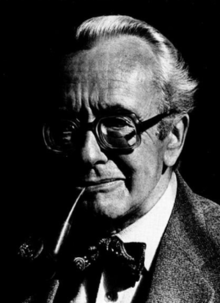
Back جي. إي. إل. أوين Arabic Gwilym Ellis Lane Owen CY Gwilym Ellis Lane Owen German Gwilym Ellis Lane Owen French G.E.L. Owen IS G・E・L・オーエン Japanese
G. E. L. Owen | |
|---|---|
 Portrait of Owen from a 1985 obituary | |
| Born | 18 May 1922 |
| Died | 10 July 1982 (aged 60) |
| Spouse | Sally Clothier |
| Academic background | |
| Education | Portsmouth Grammar School |
| Alma mater | Corpus Christi College, Oxford |
| Influences | |
| Academic work | |
| Discipline | Philosophy |
| Sub-discipline | Ancient philosophy |
| Institutions | Corpus Christi College, Oxford Harvard University King's College, Cambridge |
| Doctoral students | Martha Nussbaum, Mary Louise Gill |
| Influenced | |
Gwilym Ellis Lane Owen FBA (18 May 1922 – 10 July 1982) was a British classicist and philosopher who is best known as a scholar of ancient philosophy. He was a specialist on the work of the Greek philosopher Aristotle.
Born to a Welsh father and an English mother in Portsmouth, Owen studied Classics at Corpus Christi College, Oxford, but was called up to serve as an intelligence officer in World War II. After returning to England, he taught philosophy at the University of Oxford and moved to a chair at Harvard University in 1966. His final appointment was the Laurence Professorship of Ancient Philosophy at the University of Cambridge, which he held from 1973 until his death in 1982.
One of the leading philosophers of his generation, Owen published numerous papers on Aristotle's metaphysics and ontology. Among his best-known publications are 'Logic and Metaphysics in Some Early Works of Aristotle' (1960), 'Dialectic and Eristic in the Treatment of the Forms' (1968), and 'Aristotelian Pleasures' (1972). Although most of his work focussed on Aristotle, he also wrote an influential article on Plato's Timaeus (1953). The central theme of his scholarly work was to demonstrate the importance of method and argument over dogmatism in ancient philosophy.
According to philosopher John M. Cooper, Owen "led [a] reorientation in ancient philosophy that began in the 1950s in Britain and North America".[1] His papers, in the words of philosopher Malcolm Schofield, provided "a new way of writing about ancient philosophy",[2] while his services to the discipline were recognised with numerous honours, including a Fellowship of the British Academy.